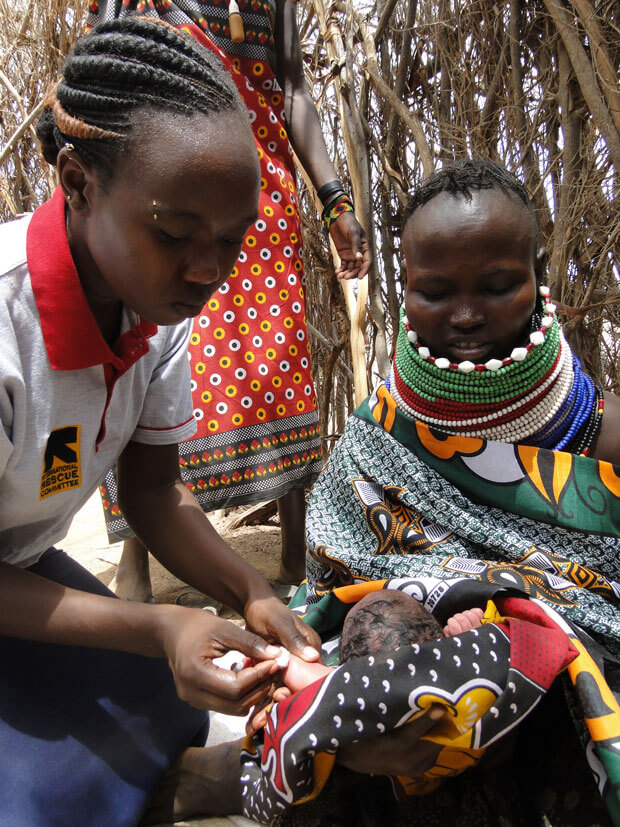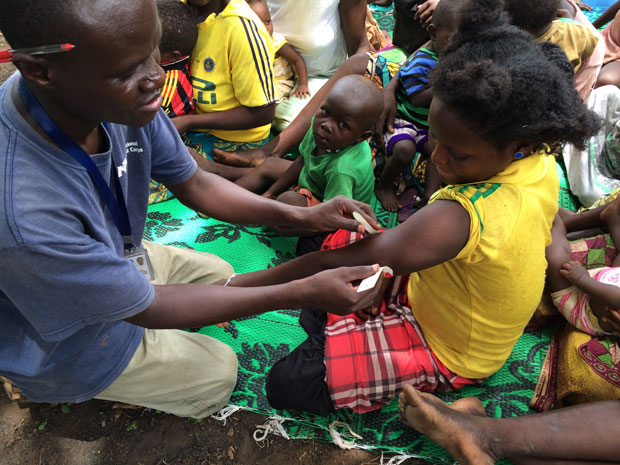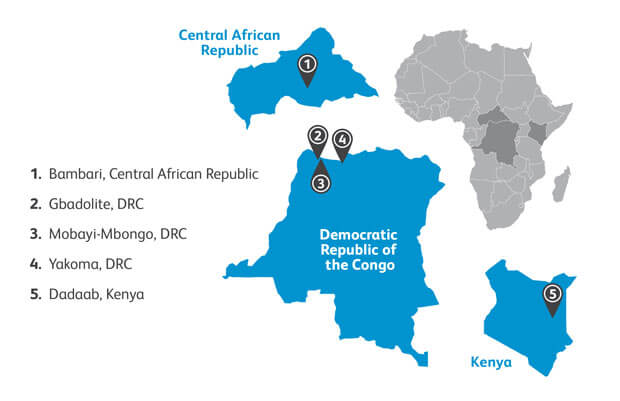Supporting Refugee Communities In Africa
Photo Credit: International Rescue Committee
Today the Pfizer Foundation* is pleased to announce new funding for three important humanitarian organizations to specifically support their work with refugees and internally displaced people. The grant recipients include the International Medical Corps., the International Rescue Committee (IRC), and World Vision. The grants will support activities in acute refugee settings in areas that have some of the greatest need.
"The ongoing refugee crisis is one of the greatest humanitarian emergencies of our time. Pfizer is committed to supporting these incredible organizations that are working tirelessly to provide essential health care to the world's most marginalized people." Caroline Roan, President of the Pfizer Foundation and Vice President of Corporate Responsibility at Pfizer.

Antonia Kamore, IRC community health program officer in Dadaab, Kenya, vaccinates a young refugee against measles. Photo Credit: Peter Biro/International Rescue Committee
Pfizer's Commitment to Humanitarian Assistance
Pfizer's approach to providing humanitarian assistance includes innovative access solutions, product donations and cash grants through the Pfizer Foundation. When crises unfold, Pfizer aims to work closely with governments around the world and non-governmental organizations (NGOs) to help provide countries with access to our medicines and vaccines.
As an example of these innovative access solutions, throughout 2017 Pfizer has provided its Pneumococcal Conjugate Vaccine (PCV) to NGOs working in these difficult settings at its lowest global price. In addition to product donations and access approaches, the Pfizer Foundation is announcing new grants to organizations supporting the refugee crisis.

Photo credit: International Medical Corp.
Focusing on Areas of Significant Unmet Need
The Pfizer Foundation will provide three grants to support work being done by the following organizations:
International Medical Corps will focus on providing life-saving nutrition, health and protection services to more than 17,000 internally displaced people (IDP) in Central African Republic (CAR) through mobile health outreach and a strengthened community health center. Over 1 million people in CAR, close to 20% of the population, have been displaced by violence.
"Pfizer's leadership in mobilizing resources to respond to this vastly underreported emergency will have an immediate impact on families displaced by violence in Central African Republic. Though the crisis is not making headlines, millions are in desperate need of lifesaving relief, and the increasing conflict has forced hundreds of thousands to flee their homes. With the generous support of Pfizer and other donors, International Medical Corps is there, providing urgently needed health care wherever and whenever it's needed most." – Rebecca Milner, Vice President, Institutional Advancement, International Medical Corp.
International Rescue Committee will focus on increasing coverage and quality of immunization services by improving vaccination rates in Kenya's Hagahera refugee camp to help prevent outbreaks of vaccine-preventable diseases such as measles and polio. Hagadera refugee camp is the largest within the Dadaab refugee community housing more than 83,000 refugees of which 4 % are children under the age of one.
"The IRC is grateful for Pfizer's generous support in reaching our goal of providing access to healthcare for the most vulnerable people living in acute refugee situations," said Mesfin Teklu Tessema, Senior Director of Health at the International Rescue Committee. "Every year, millions of refugees and displaced people, especially women and children, die from easily preventable diseases in places affected by conflict. With this grant from Pfizer, we will be able to protect refugees from vaccine preventable diseases such as measles, polio and diphtheria, and to prevent outbreaks of those diseases."
World Vision will focus on improving the health and well-being for 93,000 refugees from Central African Republic (CAR) and Democratic Republic of Congo (DRC) host communities who lack access to healthcare. They will also work to strengthen protection measures for children who are displaced. Violence in CAR has forced 540,000 people to seek refuge in neighboring countries including 192,000 in DRC.
"World Vision DRC is grateful for this Pfizer Foundation grant, which will allow our teams to provide medical support to over 93,000 CAR refugees and host community members, especially pregnant women and children under 5 years, in accessing the health care they need. Between May and August 2017 alone there was a massive influx of more than 87,000 CAR refugees in Nord Ubangui and Bas Uele Provinces, which are among the most under-served and remote provinces in the country" says Anne-Marie Connor, Interim National Director, World Vision DRC/RDC.

Map of grant recipient program locations
Understanding the Refugee Crisis in Africa
According to the 1951 Geneva Convention, a refugee is a person being persecuted for reasons of race, religion, nationality, membership of a particular social group or political opinion that is outside the country of his nationality. An internally displaced person is a person who has been forced to flee their home as a result of armed conflict, internal strife, and habitual violations of human rights, as well as natural or man-made disasters but has not crossed an internationally recognized state border.1 Nearly one third of displaced people are on the African continent where 12.4 million people in 21 countries were living in ongoing displacement as a result of conflict and violence at the end of 2015.2
To learn more:
Pfizer Vaccines Humanitarian Assistance Program
Pfizer's Humanitarian Assistance Programs
*The Pfizer Foundation is a charitable organization established by Pfizer Inc. It is a separate legal entity from Pfizer Inc with distinct legal restrictions.
04.29.2025
04.28.2025
04.24.2025
04.21.2025
04.17.2025
